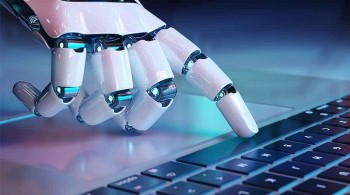The Global State of AI in April, 2025: Tools, Models, and Policies Reshaping the Future
 Top 10 Best Free AI Chatbots in 2025: Secure, User-Friendly, and High-Performing Top 10 Best Free AI Chatbots in 2025: Secure, User-Friendly, and High-Performing |
 Top 10 Best Free AI Tools for Excel to Work Smarter in 2025 Top 10 Best Free AI Tools for Excel to Work Smarter in 2025 |
 |
| 2025’s Most Powerful Minds Are Not Human |
From breakthrough technologies to new regulatory frameworks, here’s a comprehensive look at the most important developments in AI shaping the world right now.
Next-Gen AI Models and Tools Leading the Charge
The last few months have seen a surge of innovation in AI models and platforms from tech giants:
-
OpenAI launched GPT-4o, a multimodal model capable of processing and generating text, images, and audio. It’s twice as fast and half the cost of GPT-4 Turbo, now available even to free-tier users under a usage cap. GPT-4o is a major step toward accessible, high-performance AI.
-
Google rolled out Gemini 1.5, a new architecture with a 1 million-token context window and improved reasoning abilities. The Gemini 1.5 Pro model is now available in over 180 countries through Google AI Studio and Cloud Vertex AI.
-
Anthropic released Claude 3, with a standout Sonnet variant offering strong performance on logic-heavy tasks and a context window up to 200,000 tokens—suitable for deep enterprise use.
On the tools side, Google launched free public-use solutions under its AI Studio umbrella, including image analysis, translation, and speech-to-text, making advanced AI more accessible to developers, students, and researchers globally.
Global Policy Shifts: AI Governance Heats Up
Governments around the world are no longer just watching from the sidelines—they're taking bold steps to shape the trajectory of AI.
South Korea: Ambitious, Strategic, and Coordinated
South Korea is executing a full-court press on AI. The government announced the formation of a National AI Team, with 2 trillion won (≈$1.39B USD) invested into national infrastructure, including 10,000 GPUs by the end of the year. The Ministry of Defense also launched a Defense AI Research Center to accelerate military applications.
To ensure alignment across the sector, South Korea created an AI Industry Advisory Council, bringing together research institutes and telecom giants to help shape AI development strategically and ethically.
United States: A Sharp Policy Pivot
In January 2025, President Donald Trump signed an executive order to establish a national AI Action Plan focused on economic and military leadership in AI. The plan also revoked prior safety mandates from the Biden administration, which had required developers of high-risk models to submit safety data before release.
This policy reversal highlights a growing global divide in how governments approach AI—between regulation-first (EU, Japan) and innovation-first (U.S., China, South Korea).
European Union: Leading on Regulation
The EU’s AI Act, passed in late 2024, remains the gold standard in risk-based AI regulation. It classifies AI systems by potential harm and imposes strict obligations on high-risk applications. The act also bans certain uses, like real-time facial recognition in public spaces.
United Nations: Global Governance on the Table
The UN’s High-Level Advisory Body on AI published seven key governance recommendations in late 2024, including the creation of:
-
A global AI standards exchange
-
A capacity development network
-
An international dialogue forum for AI policy
These proposals will be debated at the UN’s upcoming Global AI Summit, aimed at fostering responsible and inclusive AI development.
 |
| From Chips to Policies |
Market Moves & Corporate Investments
The business world is doubling down on AI:
-
OpenAI recently secured $40 billion in new funding, putting its valuation at $300 billion. The investment supports model development, infrastructure, and a push toward open-weight models for broader adoption.
-
Amazon is investing more than $100 billion into AI infrastructure, despite recent stock pressure. Its AGI division, Lab126, introduced Nova, a system of autonomous AI agents with web-browsing capabilities and a flexible memory structure for task execution.
-
Lightmatter, a U.S. photonics company, revealed new chip designs using light instead of electricity to reduce power consumption in AI systems—part of a wider trend toward specialized AI hardware.
Education, Ethics & Ecosystem Building
AI isn’t just about technology—it’s also reshaping how we learn, govern, and prepare for the future.
-
The University of Pennsylvania kicked off its second AI Month with speakers and panels on ethics, entrepreneurship, and sustainability.
-
In Washington, the U.S. House Subcommittee on Education held a hearing titled “From Chalkboards to Chatbots,” exploring how AI will transform K-12 education and what safeguards are needed.
-
Corporations like Yokogawa in Japan introduced internal AI Governance Codes to guide ethical deployment across business operations.
What’s Next?
AI is no longer a “future” technology—it’s here, embedded in economies, security strategies, and everyday tools. While the arms race in model development continues, the real long-term battle may lie in governance, safety, and global standards.
The stakes are high. But so is the momentum.
 Top 20 Most Popular AI Tools With the Highest Monthly Traffic in 2025 (Updated) Top 20 Most Popular AI Tools With the Highest Monthly Traffic in 2025 (Updated) Discover the 20 most visited AI tools in the world as of March 2025, based on real user traffic. Learn what makes tools like ChatGPT, ... |
 Top 20 Countries Using AI Tools in 2025: Global Trends and Key Insights Top 20 Countries Using AI Tools in 2025: Global Trends and Key Insights AI tools are transforming the digital world. This report reveals the top 20 countries leading global AI adoption in 2025, with key usage stats, growth ... |
 Top 10 Best AI Writing Tools For Journalists, Editors in 2025 Top 10 Best AI Writing Tools For Journalists, Editors in 2025 AI-powered writing tools are revolutionizing modern journalism by helping writers craft more fluent and engaging articles. Discover the Top 10+ Free and Paid AI Writing ... |
 Top 10+ Free AI Tools to Instantly Convert Text into Videos in 2025 Top 10+ Free AI Tools to Instantly Convert Text into Videos in 2025 The rise of artificial intelligence (AI) has revolutionized content creation, enabling users to effortlessly generate images, text, videos, and audio using powerful free AI tools. |
























